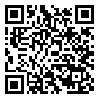BibTeX | RIS | EndNote | Medlars | ProCite | Reference Manager | RefWorks
Send citation to:
URL: http://ohhp.ssu.ac.ir/article-1-381-en.html
Background: Due to the increase of anxiety caused by COVID 19 in medical staff, it is necessary to identify and develop strategies to deal with anxiety among them. Therefore, this study aims to investigate the role of exercise and practicing religious beliefs on medical staff's anxiety caused by coronavirus.
Materials and Methods: This is a quasi-experimental study, performed through pretest and posttest. The study population was medical staff of hospitals in in several provinces of Iran, who provided services to patients with COVID 19. The sample size was 54 people, who were randomly and purposefully selected. The research instrument was the anxiety questionnaire of Coronavirus designed by Alipour et al. (2017). ANOVA, dependent t-test, and LSD post hoc tests were used to analyze the data after checking the normality of the distribution of scores by SPSS software.
Results: The results showed that there was a significant difference between pretest and posttest scores in the groups of voluntary exercise (t=21/91), voluntary religious practice (t=14/15), and random exercise (t=3/84), which shows their effect on reducing anxiety in the treatment staff. There was no significant difference between pretest and posttest scores of the control group (t=0/566) and random religious practices (t=1/595). The results also suggested that the groups of voluntary religious practice, voluntary exercise, and random voluntary exercise experienced the lowest amount of anxiety, respectively.
Conclusion: Exercising, willingly or unwillingly, reduces anxiety in the treatment staff due to predominance of its physiological aspects. However, practicing religious rituals reduces anxiety, only when it is based on the individual's will.
Received: 2021/07/20 | Accepted: 2022/01/30 | Published: 2022/04/24
| Rights and permissions | |
 |
This work is licensed under a Creative Commons Attribution-NonCommercial 4.0 International License. |






